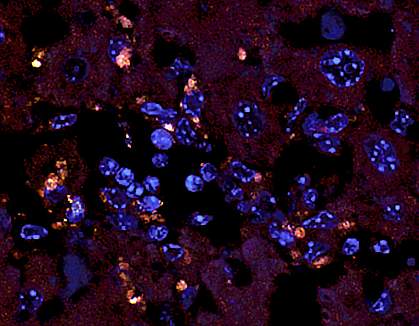You are here
March 27, 2018
Gut microbe drives autoimmunity
At a Glance
- Scientists found evidence that a certain gut microbe can trigger autoimmune disease in mice that are prone to such disease and identified the same microbe in people with autoimmune diseases.
- The results suggest new avenues for treating debilitating and potentially lethal autoimmune diseases.

The human gut harbors a complex community of microbes that affect many aspects of our health. Known as the gut microbiota, these bacteria help with metabolism and maintaining a healthy immune system.
The lining of the intestine forms a barrier that is crucial to containing gut microbes. If the lining is breached and a gut microbe is able to get into the bloodstream and nearby organs, it can cause disease. Despite the fact that the body has many ways to prevent the breach, microbes sometimes get through.
Previous studies have linked certain gut microbes to autoimmune disease, in which the immune system mistakenly attacks the body’s own tissues. A team led by Dr. Martin Kriegel at Yale investigated whether microbes breaching the gut barrier were involved in autoimmune disease. Their study was funded in part by NIH’s National Institute of Allergy and Infectious Diseases (NIAID), National Institute of Diabetes and Digestive and Kidney Diseases (NIDDK), and National Institute of Arthritis and Musculoskeletal and Skin Diseases (NIAMS). Results appeared in Science on March 9, 2018.
The researchers first tested how mice predisposed to autoimmune disease were affected by antibiotic treatment. In untreated mice, they found bacteria in nearby lymph nodes and the liver at 16 weeks of age, and also in the spleen 2 weeks later. Mice treated with the antibiotics vancomycin or ampicillin had this deadly growth suppressed.
Analysis of cultures from nearby lymph nodes, liver, and spleen revealed the presence of a bacterium called Enterococcus gallinarum. When germ-free mice were colonized by E. gallinarum, the bacteria disrupted the gut barrier, moved into the lymph nodes and liver, and triggered an autoimmune response.
To test whether depleting E. gallinarum alone could blunt autoimmune responses, the team developed vaccines using heat-killed bacteria. Vaccinating the prone mice against E. gallinarum, but not against two other gut microbes, reduced autoimmune responses and prolonged survival. In addition, E. gallinarum wasn’t found in the organs of the vaccinated mice. These results show that a microbe-specific treatment can halt autoimmune responses without suppressing the entire immune system, which can have serious side effects.
Finally, the researchers examined liver biopsies from people with autoimmune diseases. They found E. gallinarum in liver biopsies from three people with systemic lupus erythematosus, an autoimmune disease that can damage tissues all over the body. Similarly, the scientists found E. gallinarum in liver biopsies from most people tested who had autoimmune liver disease. Biopsies from healthy liver transplant donors did not have the microbe.
Taken together, these findings show that, in those who are prone, E. gallinarum can move through the gut barrier and into other organs to drive autoimmune responses. The results suggest new approaches to developing therapies for autoimmune diseases.
“The vaccine against E. gallinarum was a specific approach, as vaccinations against other bacteria we investigated did not prevent mortality and autoimmunity,” Kriegel says. “Treatment with an antibiotic and other approaches such as vaccination are promising ways to improve the lives of patients with autoimmune disease.”
—by Harrison Wein, Ph.D.
Related Links
- Blocking Stomach Acid May Promote Chronic Liver Disease
- Changing Gut Bacteria in Crohn’s Disease
- Infant Gut Microbes Linked to Allergy, Asthma Risk
- Food Additives Alter Gut Microbes, Cause Diseases in Mice
- Diet Affects Autoinflammatory Disease Via Gut Microbes
- Gut Microbes Linked to Rheumatoid Arthritis
- Your Microbes and You: The Good, Bad and Ugly
- Autoimmune Diseases
References: Translocation of a gut pathobiont drives autoimmunity in mice and humans. Manfredo Vieira S, Hiltensperger M, Kumar V, Zegarra-Ruiz D, Dehner C, Khan N, Costa FRC, Tiniakou E, Greiling T, Ruff W, Barbieri A, Kriegel C, Mehta SS, Knight JR, Jain D, Goodman AL, Kriegel MA. Science. 2018 Mar 9;359(6380):1156-1161. doi: 10.1126/science.aar7201. PMID: 29590047.
Funding: NIH’s National Institute of Allergy and Infectious Diseases (NIAID), National Institute of Diabetes and Digestive and Kidney Diseases (NIDDK), and National Institute of Arthritis and Musculoskeletal and Skin Diseases (NIAMS); Women’s Health Research at Yale; O’Brien Center at Yale; Arthritis National Research Foundation; Arthritis Foundation; and Lupus Research Institute.
